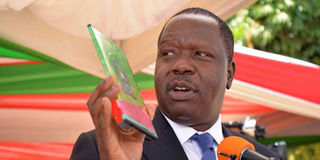Manage competition but also check other practices undermining integrity of exams

Education Cabinet Secretary Fred Matiang'i. Only 11 percent of 2017 KCSE exam candidates qualified for university. PHOTO | FILE | NATION MEDIA GROUP
What you need to know:
- By banning ranking of schools and candidates, the Government sought to rid the education system of a dangerous, competitive trend that was hurting the quality of learning.
- Dr Fred Matiang’i, the Education Cabinet Secretary, was spot-on when he described it on Wednesday as the “lowest form of intellectual dishonesty,” promising to end it once and for all.
- When cheating happens, the estimate of the candidate’s performance becomes inaccurate.
If the ban on ranking has removed the pomp from the annual ritual to release the Kenya Certificate of Primary Education (KCPE) exam results, the increase in cases of cheating has cast a shadow on the whole exercise.
By banning ranking of schools and candidates, the Government sought to rid the education system of a dangerous, competitive trend that was hurting the quality of learning.
Schools had reduced pupils to parrots trained to memorise and reproduce facts simply to pass exams.
Rote learning and teaching for the examination had become the norm, while complicit headteachers and school owners had devised ingenious ways to market their institutions by setting up satellite schools where weak learners would be registered, while a carefully selected smaller batch would be enrolled separately and drilled to cram facts.
In the end, the elite band would carry the day with a high mean grade, which the schools would then use to attract more students.
While the ban might have helped diminish the problem, it served as a drastic, provisional and superficial action to address a deeply-rooted menace in the education system.
Examinations are in themselves competitive and ranking is just a method of describing the achievements after the contest.
It is an age-old tradition in schools going up to universities globally.
What the Government should focus on is how to stamp out cheating.
Dr Fred Matiang’i, the Education Cabinet Secretary, was spot-on when he described it on Wednesday as the “lowest form of intellectual dishonesty,” promising to end it once and for all.
Any trained teacher will readily admit that validity is the most critical aspect of any test.
SELF-DAMAGING ACTIVITY
The concept refers to the extent to which inferences gleaned from a score are accurate.
When cheating happens, the estimate of the candidate’s performance becomes inaccurate.
Inflated grades or marks are a misrepresentation of the individual’s or even the school’s performance.
The consequence is that the integrity of the examination is compromised.
The ultimate way of judging an examination system is by the quality of graduates it produces.
If pupils are taught to cheat in primary school, they will take the tendency for short-cuts all the way to university and onto the job market.
Granted, a majority of the candidates work hard for top grades.
Those who passed deserve to be congratulated, while those who did not should be encouraged to pursue careers that match with their skills to become diligent men and women.
EXAMINATION INTEGRITY
To stamp out cheating, the Government should shine the spotlight on lazy teachers prone to chronic absenteeism.
This rogue lot amplifies the rush for rote teaching in a Faustian bargain with innocent lives wasted at the altar of public glory.
Unqualified teachers who may be degree holders but lack pedagogical skills are also culprits — just as are poor school administrators.
Still, the fact that more than 200,000 pupils are locked out of secondary school each year due to lack of spaces serves to create a maddening rush for the few opportunities available hence creating reasons to cheat by all means.
If ever there was a legacy Dr Matiang’i should crave to be remembered for, it is the restoration of integrity in national examinations.




